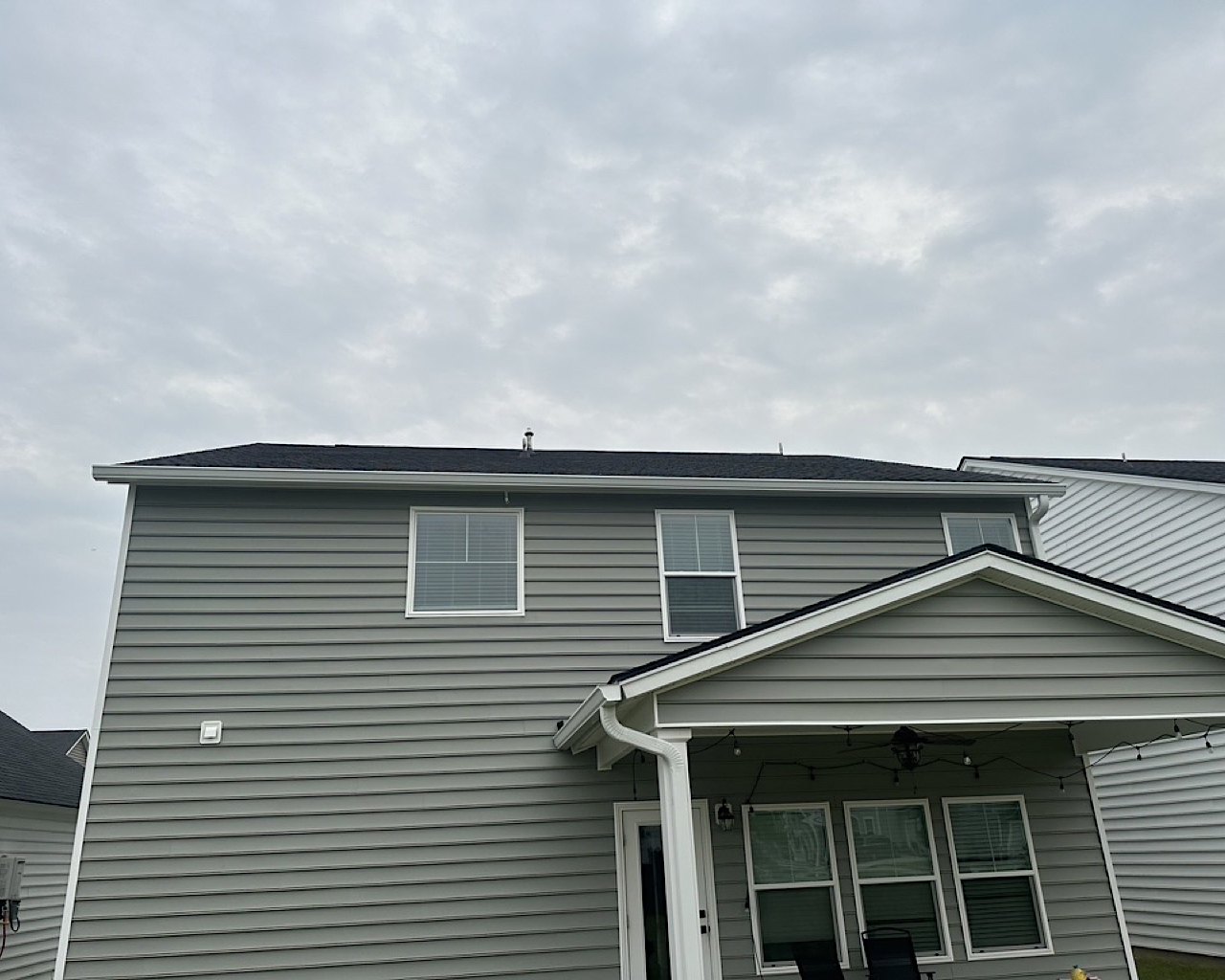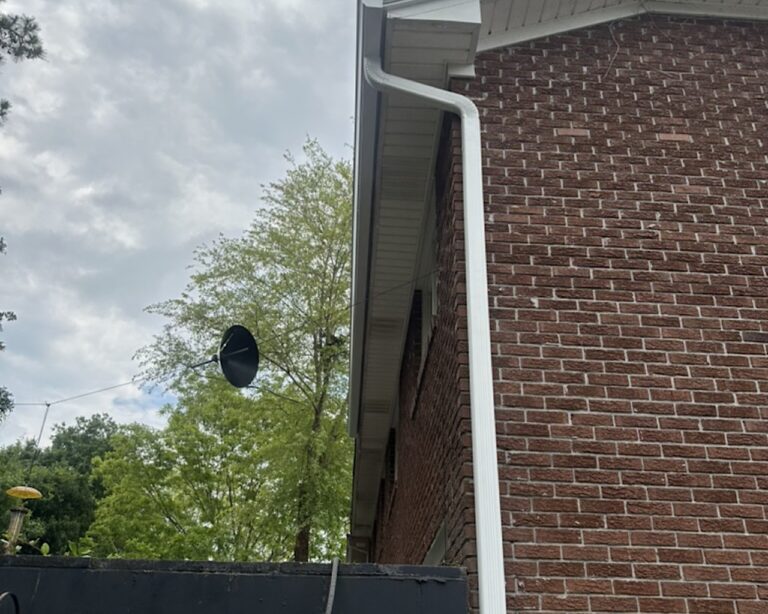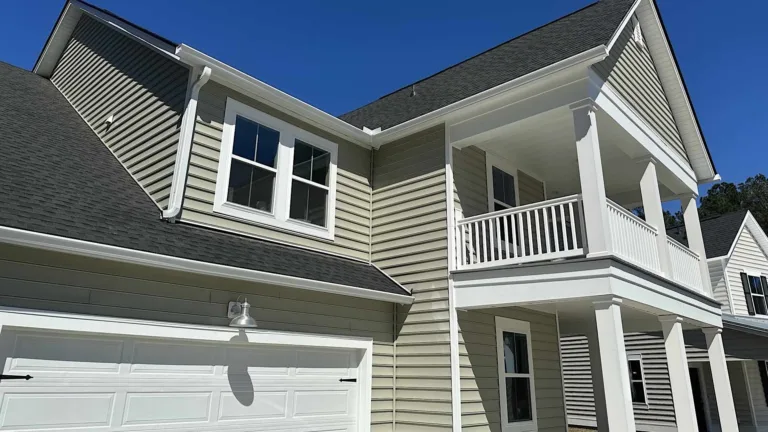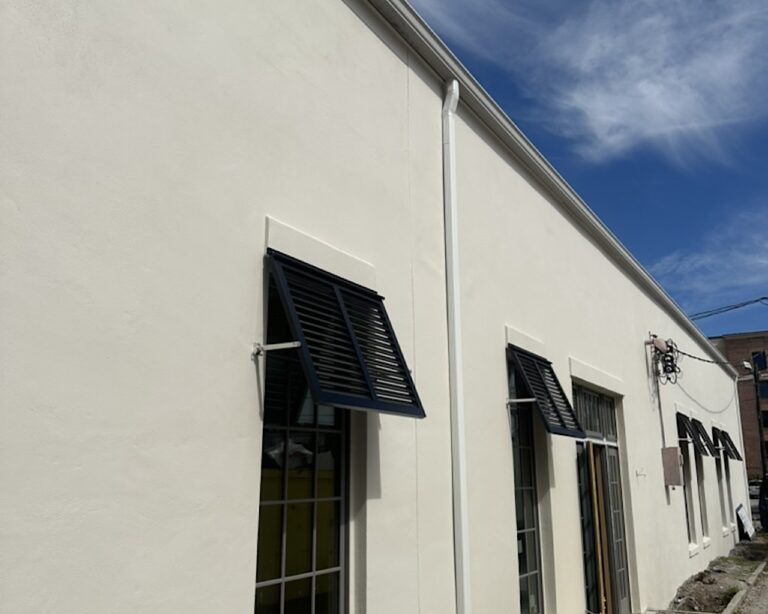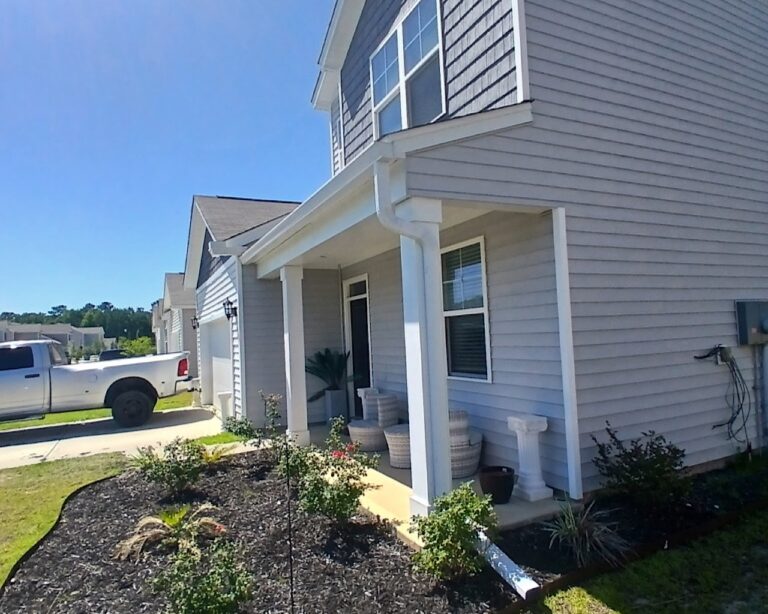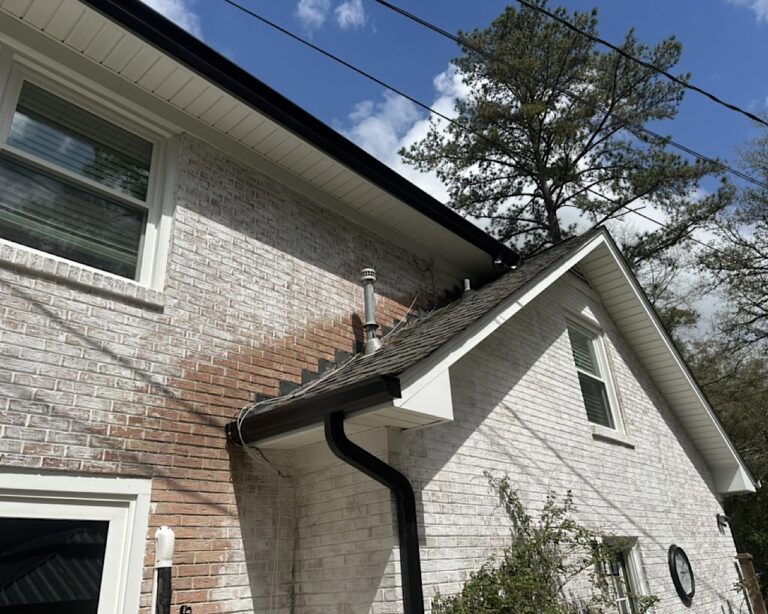Are Gutters Necessary? Understanding Their Importance for Your Home
Are you asking yourself, are gutters necessary for your home? Gutters are essential for preventing water damage and maintaining your home’s structural integrity.
Without gutters, rainwater can damage your roof, walls, and foundation. This article will explain why gutters are important, when they might not be needed, and alternative solutions.
Key Takeaways
- Gutters are essential for redirecting rainwater away from homes, protecting structures from water damage and maintaining foundational integrity as part of a home’s drainage system.
- Without gutters, homeowners risk costly repairs due to water-related issues such as basement flooding, soil erosion, and structural damage.
- While gutters are crucial for many homes, certain factors like climate, proper grading, and architectural features can influence their necessity.
What Are Gutters and Their Function?
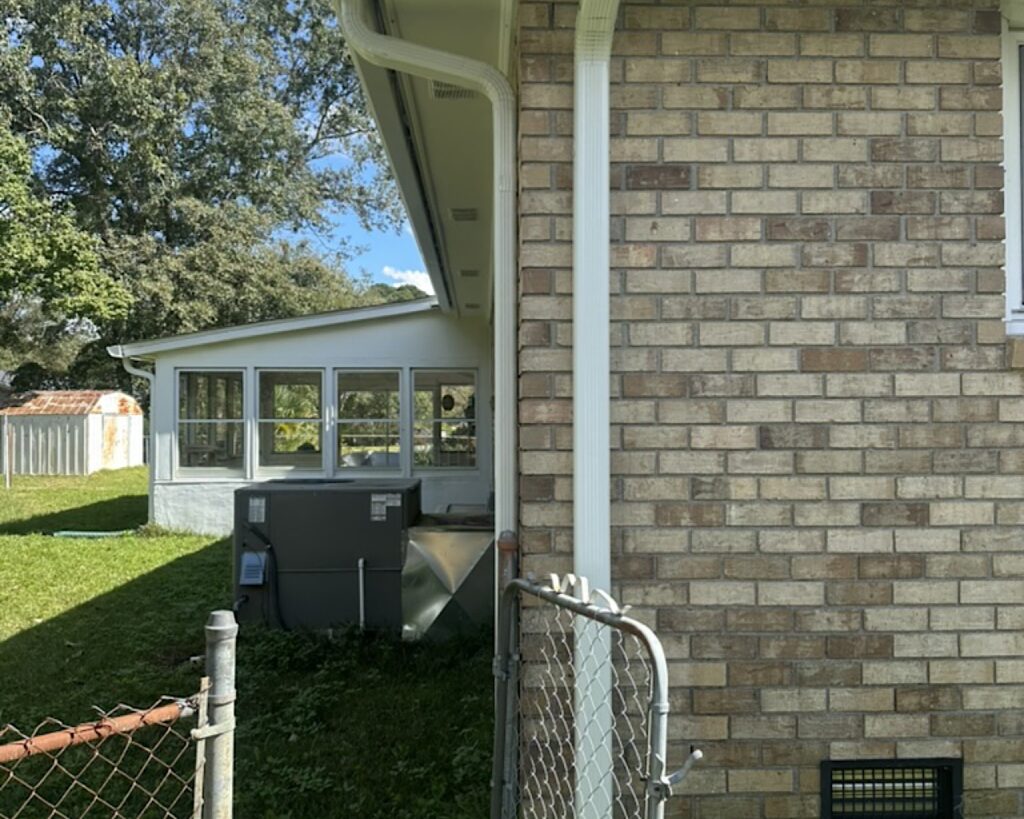
Rain gutters are essential for managing water flow from roofs and preventing structural damage. These systems collect and channel rainwater away from roofs and houses, protecting various parts of your home, including the roof, walls, and foundation, from water damage.
Gutters are typically constructed from materials such as metal, plastic, and wood, each offering unique benefits and durability. Gutters are often secured to the fascia board, which provides structural support and is crucial during the installation process. Additionally, galvanized steel is a popular choice for gutter materials due to its strength and durability, making it suitable for heavy-duty applications despite the potential for rust over time.
The primary purpose of a gutter system is to channel rain and stormwater away from your house. Gutter downspouts guide this water from the gutters to the ground, ensuring proper drainage and preventing water from pooling on the roof.
This redirection of rainwater protects the foundation by maintaining its stability and avoiding water damage inside the house.
In essence, new gutters work to safeguard your home’s structural integrity by directing water away from vulnerable areas. Gutters direct water away effectively. Gutters direct are essential for maintaining this function.
Key Reasons to Install Gutters
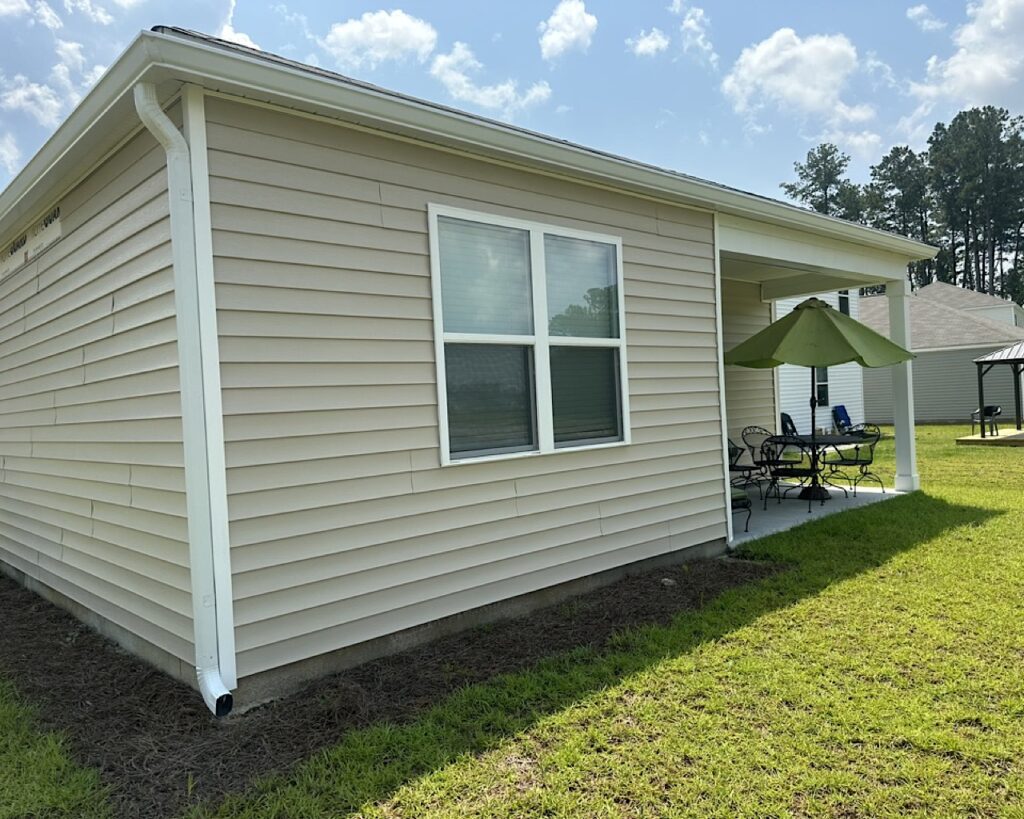
Installing gutters is essential for managing the flow of water away from your home’s foundation, thereby preventing extensive water damage. Without gutters, homeowners risk facing issues such as soil erosion, structural damage, and costly repairs.
In summary, gutters installed is a crucial step to safeguarding your property and maintaining its value against water-related damage.
The key reasons to install gutters include preventing water damage, protecting landscaping, and avoiding basement flooding. Each of these aspects plays a significant role in ensuring your home remains safe and in good condition.
The following sections delve deeper into each of these reasons, providing detailed insights on how gutters contribute to your home’s overall health.
Preventing Water Damage
Gutters prevent water damage by channeling rainwater away from the foundation of your home, protecting roofs, walls, and foundations. They help maintain the integrity of your siding by directing rainwater away, thus preventing stains and damage.
Gutters are crucial for homes with basements because they manage water runoff effectively, preventing basement flooding.
Improper water runoff can lead to foundation damage, basement flooding, and soil erosion. Mold growth can also occur as a result of uncontrolled rainwater seeping into structural components due to inadequate gutter systems. Regular maintenance and cleaning of gutters are essential to ensure their proper functioning and prevent issues like clogged gutters, which can cause rotting siding and cracked walls.
Maintaining your gutters in good condition helps avoid major water-related issues and costly repairs.
Protecting Landscaping
Gutters protect landscaping by directing rainwater to specific areas, preventing pooling water and water damage. Properly functioning gutters maintain the integrity of your landscaping by directing water runoff efficiently, preventing soil erosion and plant damage.
This not only preserves the beauty of your garden but also ensures that your outdoor space remains healthy and vibrant.
Avoiding Basement Flooding
Gutters are essential for preventing basement flooding by managing excess rainwater effectively. By directing water away from the house and ensuring proper drainage, gutters protect your basement walls from potential flooding and water damage.
This is especially important during heavy rains when the risk of water accumulation around the home’s foundation increases.
Situations Where Gutters May Not Be Necessary
While gutters are crucial for many homes, there are situations where they might not require gutters. Factors like climate, landscaping, and proper grading of the yard can significantly reduce the need for gutters.
Assessing these factors can help you determine whether your home requires gutters or if alternative water management methods might suffice.
In areas that receive minimal annual rainfall, the necessity for gutters is reduced. This is due to the lower volume of water needing to be directed away.
Additionally, architectural features like large overhangs and substantial eaves can naturally direct water away from the foundation, reducing reliance on gutters.
The following subsections explore these scenarios in more detail, helping you understand when gutters might not be necessary.
Arid Climates
In arid climates, the natural absorption of rainwater by the ground reduces the necessity for gutters. These desert environments quickly soak up rain, making extensive gutter systems less critical.
However, it’s still important to consider occasional heavy rains and ensure that any water runoff is managed effectively. In contrast, in a wet climate, heavy downpours and high winds can complicate gutter maintenance and effectiveness, leading to potential water damage if not properly managed.
Proper Grading
Proper grading of the yard can significantly reduce the need for gutters by naturally directing water away from the foundation. Well-graded yards efficiently channel water away from the home’s base, preventing moisture pooling and potential damage.
Incorporating drainage systems like French drains can also provide an alternative to traditional gutters.
Architectural Features
Architectural features such as large overhangs and substantial eaves can significantly reduce the need for gutters. These features help direct rainwater away from the foundation, minimizing potential water damage to the building.
Homes with substantial eaves can effectively keep rainwater away from the structure, further decreasing the reliance on gutter systems.
Common Gutter Problems and Solutions
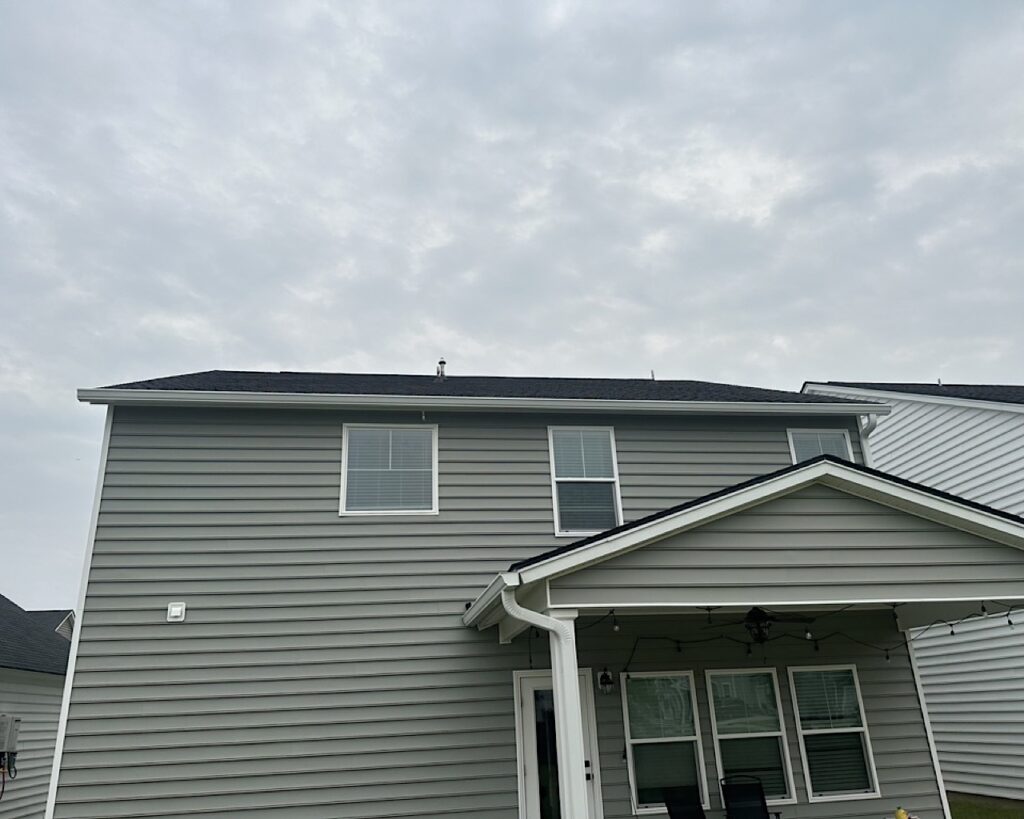
Common problems associated with gutters include clogging, leaking, and ice dams. Each of these issues can lead to significant damage if not addressed promptly.
Removing old gutters and upgrading to new, higher-quality materials can enhance the overall functionality and appearance of your gutter system, while also noting that the installation costs vary significantly based on the material chosen.
Regular maintenance and timely repairs are essential to keep your gutter system functioning correctly and to prevent costly repairs.
Proper inspection can prevent costly repairs by identifying small issues before they escalate. Addressing minor damage promptly can prevent more significant issues and expenses later on.
Many professional services offer comprehensive gutter maintenance plans to ensure ongoing protection, maintenance free gutter guards.
The following subsections explore common gutter problems and their solutions in more detail.
Clogging
Regularly cleaning gutters twice a year, especially in spring and fall, is recommended to prevent clogging. Essential tools for maintaining gutters include gloves, a ladder, a gutter scoop, an electric drill, and a stabilizer.
Debris such as leaves and twigs, along with other debris, can accumulate in gutters, leading to clogs that prevent proper water flow. Keeping gutters clear of debris is crucial for maintaining their functionality and protecting your home from water damage.
Leaking
Gutter leaks are often caused by damaged sections and improperly sealed joints, which require repair or replacement. Applying plastic roofing cement can effectively repair small leaks in gutters, ensuring that water is directed away from your home and preventing potential damage.
Ice Dams
Gutters help prevent the formation of ice dams. By doing so, they also prevent heat from becoming trapped. Gutters reduce energy costs by preventing heat escape through the roof.
Ice dams form when warm air from the home melts snow on the roof, causing water to refreeze at the eaves, especially during the period of melting snow.
Proper insulation in the attic can help prevent the formation of ice dams by regulating roof temperature. Reducing ice dam formation involves maintaining proper insulation and minimizing heat loss from the roof.
Alternatives to Traditional Gutters
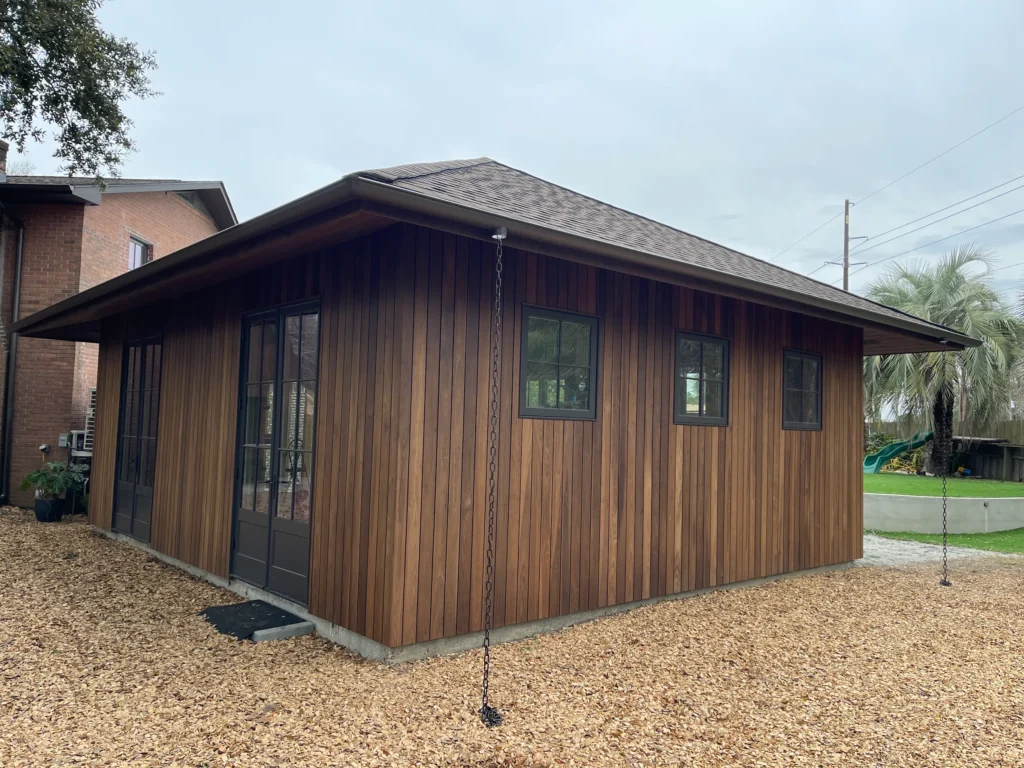
There are several alternative drainage systems that can effectively manage roof runoff. Modern alternatives to traditional gutters include rain diverters and splash blocks.
Seamless gutters are another option, efficiently directing water away from roofs and homes. The quality of gutter hangers is crucial in securing both traditional and seamless gutters to prevent water damage.
Other drainage solutions like French drains, dry wells, and permeable paving can also replace gutters. These alternative methods can offer effective water management while preserving landscaping and reducing construction costs.
Each alternative has unique benefits and can be chosen based on specific needs and preferences. The following subsections explore these alternatives in more detail, providing insights into their functionality and advantages.
Rain Chains
Rain chains serve as both decorative elements and functional systems for managing water runoff from roofs. These chains slow down the water’s descent, transforming rainwater into a decorative feature.
Rain chains can enhance the aesthetic appeal of a home while serving as an effective means of directing water runoff.
French Drains
French drains are systems designed to redirect water away from the foundation. French drains prevent water accumulation and potential damage by channeling water away from the foundation.
One of the key benefits of French drains is their discreet installation, which does not disrupt the landscape while effectively managing water runoff. Overall, French drains serve as an effective drainage solution that protects homes from water-related issues while blending seamlessly into the environment.
Drip Edges
Drip edges are metal strips that direct water away from fascia boards and siding on both sides. They protect vulnerable areas by channeling water runoff, reducing the risk of water damage to the fascia and siding.
Cost of Installing Gutters
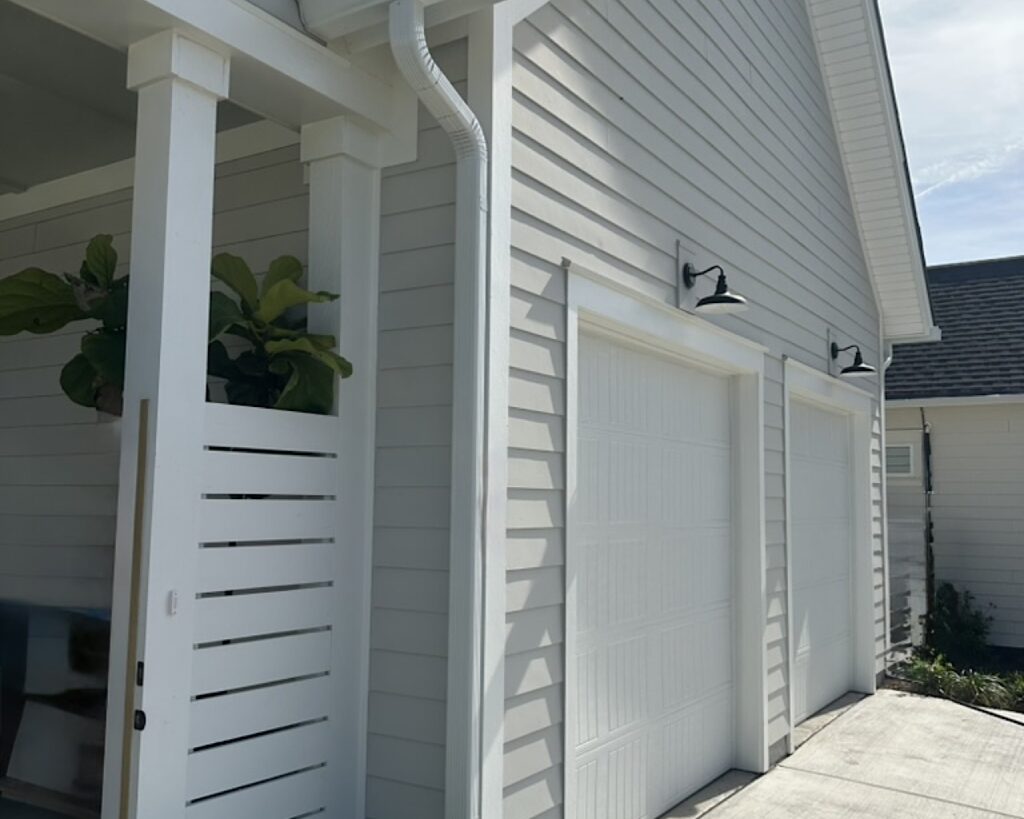
Gutter installation costs typically range from $2,300 to $6,000 for an average home. The average cost per linear foot for gutter installation is around $32. Gutters can be constructed from a range of materials.
For a new house with a metal roof, while it might be tempting to skip installing gutters due to the roof’s durability, having gutters is still recommended for added protection against potential damage.
Common options include aluminum, vinyl, steel, and copper. Installing vinyl gutters costs around $3,600 for an 800-square-foot single-story home. This estimate provides a general idea of expenses involved.
The cost of installing gutters depends on the material used and the size of your home. The following subsections provide detailed insights into the costs and benefits of different types of gutters, helping you make an informed decision.
Aluminum Gutters
Aluminum gutters are favored for their lightweight nature and resistance to rust. They are a popular choice due to their durability and relatively low cost compared to other materials.
Aluminum gutters provide a good balance between performance and price, making them an attractive option for many homeowners.
Vinyl Gutters
Vinyl gutters can range in installation cost from $12 to $34 per linear foot. A major drawback of vinyl gutters is that they are not as durable in extreme weather conditions. Vinyl gutters are one of the more affordable gutter options on the market.
Overall, while vinyl gutters offer affordability, their durability in harsh weather may be a concern for homeowners.
Copper Gutters
Installing higher-end materials, such as copper gutters, for a 3,000-square-foot home can be quite expensive. The cost can reach around $97,500. Copper gutters are known for their unique and attractive appearance that can enhance the architectural beauty of a home. Apart from their high cost, copper gutters develop a unique patina over time, adding to their charm and character.
How to Maintain Your Gutter System
Regular maintenance of your home’s exterior is crucial to prevent gutter issues and ensure functionality. Here are some key points to consider:
- Routine cleaning and thorough inspections of gutters help in identifying and fixing problems early.
- Consistent maintenance can avert significant repair expenses related to gutter failure.
- When properly maintained, copper gutters can exceed 50 years in lifespan, showcasing the value of maintenance.
Maintaining your gutter system involves regular cleaning, inspecting for damage, and potentially hiring professional services. The following subsections provide detailed insights into each of these aspects, ensuring your gutters remain in top condition.
Regular Cleaning
Regular cleaning of gutters is essential to prevent clogs and water buildup. Cleaning your gutters is advised at least twice a year. This maintenance helps prevent potential issues. Neglecting to clean your gutters can lead to serious issues such as water damage, basement flooding, and costly repairs.
Homeowners should make gutter cleaning a part of their regular home maintenance routine to ensure long-lasting protection and proper drainage.
Inspecting for Damage
Before: Homeowners should regularly check their gutters for signs of rust, cracks, or detachment from the house. Regular checks should include looking for rust, sagging, or gaps in gutters, as well as cracks or gaps in seams and joints to ensure the integrity of the gutter system.
After: Homeowners should regularly check their gutters for signs of:
- Rust
- Cracks
- Detachment from the house
- Sagging
- Gaps in gutters
- Cracks or gaps in seams and joints
This ensures the integrity of the gutter system.
Identifying and addressing these structural issues early can prevent severe damage and potential water-related problems.
Professional Services
Hiring professional services for gutter cleaning and maintenance ensures that the job is done effectively and safely. If you lack the right tools or skills for gutter cleaning, it is advisable to hire a professional gutter company.
Professional gutter installation companies provide installation assistance as well as roofing services, using specialized equipment to remove debris more effectively than manual methods.
Summary
In summary, gutters play a vital role in protecting your home from water damage, preserving landscaping, and preventing basement flooding. While there are scenarios where gutters may not be necessary, such as in arid climates or homes with proper grading and architectural features, most homes benefit significantly from having a well-maintained gutter system.
Regular cleaning, inspecting for damage, and hiring professional services are essential to ensure the longevity and functionality of your gutters. Ultimately, investing in gutters or alternative drainage solutions can save you from costly repairs and maintain the value of your home.
Frequently Asked Questions
Gutters are essential for directing water away from your roof and protecting your home’s foundation, walls, roof shingles, and landscaping from potential water damage. Their proper function is crucial in maintaining the integrity of your property.
You should clean your gutters at least twice a year, ideally in spring and fall, to prevent clogs and ensure proper water flow. Regular maintenance is essential to avoid potential damage to your property.
You can install gutters yourself, but hiring professionals is advisable to ensure the job is done correctly and safely.
Indeed, alternatives to traditional gutters include rain chains, French drains, and drip edges, which can effectively manage water runoff while enhancing landscaping and lowering construction expenses.
The costs associated with different types of gutters primarily depend on the material used: aluminum gutters are lightweight and rust-resistant, vinyl gutters are budget-friendly but not as durable, while copper gutters are premium options known for their distinctive look. Consider your budget and local weather conditions when selecting the best option for your home.

